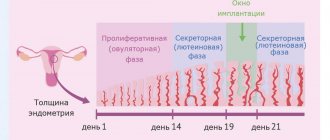Pregnancy is a joyful and at the same time exciting event for a woman. Some people wait and prepare for it in advance, but for others it comes as a complete surprise. And most often, expectant mothers are tormented by doubts. Has there been a pregnancy? What symptoms might a woman experience? What are the earliest signs of pregnancy to watch for?
Ekaterina Zhumanova , gynecologist, candidate of medical sciences, head of the center for gynecology, oncology, reproductive and aesthetic medicine at the Medsi Clinical Hospital, answers these questions .
How long does it take for signs of pregnancy to appear?
It is believed that the very fact of conception should evoke a characteristic response from the female body. After all, a real event occurred in the body - fertilization of the egg. And any woman simply cannot help but notice this.
In fact, it is impossible to identify signs of pregnancy on the day of conception, just as it is impossible to see them over the next week. According to Ekaterina Zhumanova, fertilization of the egg occurs during the ovulation period, which usually occurs on the 14th day of the menstrual cycle. After this, the fertilized egg begins to change. It increases in size, descends into the uterus and becomes fixed in it. But for the body these processes are not at all as significant as is commonly believed.
“Sometimes a pregnant woman can actually feel something in the second phase of the cycle,” clarifies Ekaterina Zhumanova. “But these cannot be called signs of pregnancy in the early stages. Feelings are extremely individual. We can say that the woman feels differently, not as usual.”
pixabay.com/
Body changes indicating pregnancy
It often happens that you do not notice a single sign of pregnancy from those written above - but, nevertheless, you may find yourself pregnant. Why does this happen?
This can happen if your current pregnancy is not your first – but your second, third or fourth. This happens due to the fact that the body has already managed to adapt to pregnancy during the last time. Therefore, he does not reject the fetus, because the woman’s immune system is not activated (does not signal the fetus as a possible danger to it). This is why it is so undesirable to have an abortion during your first pregnancy - the body may decide that the process inside it has not been completed and this may negatively affect your ability to become pregnant in the future. The body will perceive pregnancy as an infection - and provoke a miscarriage within itself.
The following external changes may be the first signs of early pregnancy:
- swollen face, as well as arms and legs (swelling occurs from overstrain of internal organs due to hormonal changes in the body).
- strong blush (due to blood flow);
- pimples and blackheads (including for those who have never encountered such skin problems);
- venous patterns begin to cover the breasts (this is how they prepare to produce milk for the baby);
- disruptions in the functioning of the gastrointestinal tract (bloating, flatulence and constipation - all these unpleasant things make you more closely monitor your diet).
The very first sign of pregnancy
The development of new life in the body can occur unnoticed within about two weeks. By the time the next menstruation begins, the “first bells” are just appearing. Signs of pregnancy before a missed period are extremely rare and may include minor changes in well-being - mild fatigue or changes in mood. The main companion of most expectant mothers - toxicosis - appears a little later, usually on the third or fourth day after a delay in menstruation.
There are a lot of stereotypes regarding toxicosis. It is believed that it only manifests itself with nausea and vomiting in the morning. Such signs of pregnancy can indeed be observed in the first weeks, but the very first days are usually different. Apathy, fatigue, and weakness occur much more often. The woman becomes lethargic, gets tired at work, and during the day she has the desire to lie down.
The degree to which these symptoms manifest is always individual. Some may notice severe fatigue, while others may not notice any changes in their body or well-being.
pixabay.com/
Reasons for the absence of signs of pregnancy
Many theories have been proposed regarding pregnancy in which there are no symptoms. None of them fully explains the reasons why gestation occurs without symptoms.
The prerequisites for carrying a baby unnoticed are:
- Irregular menstrual cycles are the most common cause of asymptomatic gestation. Women get used to the disorder and mistake long-term absence of menstruation as the consequences of overwork, taking medications or hormonal imbalance.
- “Fetal washing” is a phenomenon that occurs in approximately 30% of pregnant women. It is a scanty short-term bleeding that occurs on the day of the onset of menstruation, and therefore is mistakenly mistaken for menstruation by women. It occurs due to the formation of new vessels necessary for feeding the fetus, or, less commonly, placental abruption.
- Pregnant woman's complexion. The abdomen may not be noticeable in obese and petite patients. The first ones mistake an increase in waist size for a simple weight gain. In the latter, babies, as a rule, acquire the same build, which leads to a slight increase in the abdomen.
- Attachment of the fertilized egg to the back wall of the uterus, causing the fetus to grow “inside” the abdominal cavity. The belly can be completely invisible if a woman has well-trained abs. In this case, the muscles act as a frame that prevents the fetus from protruding beyond the abdomen.
- Pathologies. Oligohydramnios and fetal malnutrition are common causes of pregnancy without symptoms. Insufficient amniotic fluid and problems with intrauterine development lead to prematurity and various defects in the baby, so pregnant women need to undergo regular examinations with a gynecologist.
- Inexperience, due to which women mistake pregnancy without symptoms for indigestion. This phenomenon is common among patients who are pregnant with their first child and mistake the baby’s movements for rumbling and increased gas formation in the intestines.
Reading: What to cook for breakfast for a child one year old and older: recipes for quick and tasty dishes
Manifestations of toxicosis in the first days after conception
Medicine still cannot answer the question of why some women do not have toxicosis at all, while others literally lie flat. Each woman’s body is individual, as is the reaction to the development of new life in it. These symptoms do not depend either on the physical fitness of the expectant mother or on her lifestyle. Although it has been established that if a woman was physically or psychologically exhausted before pregnancy, bearing a child will be more difficult.
“Toxicosis occurs and proceeds differently for everyone,” says Ekaterina Zhumanova. - For some, it develops already from the first day of delay, for others - after two weeks, and usually lasts up to 12-14 weeks. It can manifest itself as a change in taste buds, an unexpected reaction to smell, morning sickness, lack of appetite, or, conversely, the need to eat something urgently, otherwise vomiting occurs.”
According to the doctor, mild manifestations of toxicosis are not dangerous and do not require seeking medical help. But if vomiting occurs more often than five to six times a day, this is a reason to consult a doctor. A specialist may recommend antiemetic medications or safe home remedies to relieve nausea. Mineral water with the addition of lemon juice and frequent meals in small portions alleviate a woman’s condition.
In cases of severe toxicosis, hospitalization should not be refused. If vomiting occurs up to 10 times a day, the body is losing too much water and nutrients. The loss can only be compensated for by timely drug therapy, which usually quickly improves the woman’s condition.
pixabay.com/
Benefits of pregnancy after 40
There are also positive aspects to having a child at this age. Among them are:
- Stable financial position.
- Psychological preparedness for the birth and upbringing of a baby.
- Reliable partner.
- Delaying the onset of menopause after childbirth.
How to prepare for pregnancy
In order to avoid possible complications, it is worth paying great attention to planning and managing pregnancy. The following activities are recommended:
- Consultation with a gynecologist. Pay special attention to finding the required specialist. Choose a doctor with extensive experience in managing late and complicated pregnancies.
- Examination. After consultation and medical history, the gynecologist will prescribe you a list of necessary diagnostic procedures and tests. You should not neglect such events and refuse to take them. Because thanks to the results obtained, the doctor will be able to identify possible complications during pregnancy and, if necessary, prescribe treatment.
- Normalization of nutrition and daily routine. Try to watch your diet, eliminate stress and monitor your sleep schedule. Also give up bad habits, this will help avoid complications and risks during pregnancy.
- Taking vitamin complexes. If your doctor prescribes you additional vitamin complexes, be sure to take them in the right amount.
Features of pregnancy after 40 years
A pregnant woman in adulthood requires increased attention: since the risk of complications is quite high, regular monitoring of the condition of the fetus and timely detection of any deviations in its development are necessary.
In addition to regular appointments with an obstetrician-gynecologist, the patient will need the following consultations and studies:
- Consultation with a hemostasiologist.
- Genetic consultation.
- Ultrasound of the fetus.
- Ultrasound of the mammary glands.
- Ultrasound of the thyroid gland.
- Ultrasound of the kidneys and adrenal glands.
- Prenatal screenings in different trimesters.
- General blood analysis.
- General urine analysis.
- Blood chemistry.
- Determination of blood group and Rh factor.
- Hemostasiogram + D-dimer.
- Glucose tolerance test.
- TORCH complex.
- Hormonal studies.
- Cytological examination of scrapings from the ecto/endocervix.
- Test for HIV, antibodies to Treponema pallidum, hepatitis B virus surface antigen and antibodies to hepatitis C virus.
- Bacterial culture of urine/cervical canal.
- Scrapings using the PCR method.
Is it worth giving birth after 40?
If you are not sure whether to plan a pregnancy in adulthood, be sure to consult a gynecologist.
The specialist will determine the possible risks to your health and will be able to give a definite answer whether it is worth trying to conceive a child. You can contact the International Hemostasis Clinic at any time to get the opinion of an experienced gynecologist. We employ candidates and doctors of medical sciences, expert level specialists with more than 10 years of experience.
We will be waiting for you at the address: Moscow, metro station Kropotkinskaya / Arbatskaya, B. Afanasyevsky lane, 22. Make an appointment using the online form or by phone.
External first signs of pregnancy
It is believed that literally immediately after conception a woman looks something different. That there may be puffiness of the face, swelling or a special shine in the eyes. According to the doctor, none of this is true.
Swelling is indeed typical for pregnant women, but it usually occurs later. And the only external sign may be fatigue on the face. When the body signals the need for rest, and a woman cannot afford to lie down during the day or get a good night's sleep, this is reflected in her appearance.
“If a woman is proud of her pregnancy, her gait changes,” clarifies Ekaterina Zhumanova. — She begins to walk early in the “duckling” position—belly first. And since intestinal bloating always occurs during this period, this creates a feeling of abdomen already in the early stages of pregnancy, although the uterus is still very small.”
Subjective sensations as the first signs of the first pregnancy
Often in the first weeks after conception, a woman becomes lethargic and drowsy. This occurs due to a decrease in blood pressure. In this state, blood flows from the brain to the “periphery” - the internal organs and the uterus.
According to the doctor, this is not at all dangerous for the embryo. On the contrary, the blood flow to the uterus provides the future baby with everything necessary. The woman feels drowsy and cannot concentrate. And this, according to Ekaterina Zhumanova, is a variant of the norm. This is how the body, which is undergoing a serious restructuring, signals that it needs rest. And this desire should be obeyed.
“A woman should rest, and not work 12 hours a day,” comments the doctor. “And low blood pressure is never bad; it can be easily corrected with a cup of coffee or strong tea.”
pixabay.com/
Reliable and probable signs of pregnancy
It is impossible to accurately determine early pregnancy without laboratory testing. The most reliable information is provided by a blood test for hCG - human chorionic gonadotropin, synthesized after the embryo attaches to the uterine mucosa. The hormone is predominantly concentrated in the blood, but particularly sensitive urine tests may show a pale second line in the first weeks of gestation.
Ultrasound allows you to determine pregnancy in the early stages, but with the condition that the study is carried out on a highly sensitive device by an experienced specialist. In the first weeks of development, the embryo measures no more than 4 mm, making it difficult to notice. In addition to establishing the fact of conception, this study allows you to assess the condition of the internal genital organs and identify pathology.
As a rule, these methods are used to identify pathologies of fetal development. If pregnancy is suspected, the first thing to do is a gynecological examination.
Despite the fact that a woman’s internal genital organs change already in the first weeks after conception (softening of the lower wall of the uterus, blueness of the vaginal mucosa), only an experienced specialist can accurately determine pregnancy in the early stages.
Before visiting a doctor, a woman can find out about her pregnancy by the following signs:
- Delayed menstruation. Due to the instability of the menstrual cycle in many women, it is an extremely false sign of pregnancy. Patients with a regular cycle can rely on a delay as a sign of recent conception.
- Discomfort in the chest area. Swelling and pain in the mammary glands are associated with the body’s preparation for lactation, and therefore these symptoms, as a rule, are not present in the first weeks after conception. In case of early breast tenderness, the discomfort disappears by the end of the 3rd month.
- An increase in basal temperature to 37.3-38°C, associated with increased production of progesterone. To get accurate results, measurements should be taken in the morning, without getting out of bed. An elevated basal temperature does not always mean pregnancy has occurred and may be associated with gynecological pathologies.
- Toxicosis. Nausea and vomiting bother 75% of women and disappear by the beginning of the second trimester. Unlike poisoning during pregnancy, these symptoms accompany the patient regularly and intensify upon contact with irritating odors and products.
- Low blood pressure associated with increased production of progesterone. Hormonal changes are accompanied by dizziness, weakness, drowsiness and the inability to concentrate on work.
- Vaginal discharge. Normally, after the fertilized egg attaches to the uterus, a woman experiences light, odorless, transparent discharge similar in consistency to mucus for several weeks (we recommend reading: transparent, odorless discharge during pregnancy). The purpose of this liquid is to protect the genitals from infections.
To read: Is it possible to swim in the sea during pregnancy, what are the rules for bathing pregnant women and how not to harm the baby?
READ ALSO: causes and symptoms of false pregnancy in women
Could pain be a sign of pregnancy?
Every pregnancy is different and your experience may vary. But the pain that arises against its background must be treated with caution. Painful sensations are not typical for the process of fetal development in the uterus.
If, during pregnancy, nagging or aching pain in the lower abdomen occurs, this may indicate increased tone of the uterus. This condition is dangerous as it can lead to miscarriage. A woman needs to consult a doctor and undergo additional examination to clarify the degree of tone. The condition can be corrected by taking antispasmodic drugs that are absolutely safe for mother and child.
It is much more difficult to cope with a headache. According to Ekaterina Zhumanova, if migraines and headaches bothered you before, they may intensify some time after conception. And to improve the condition, the help of a doctor is needed.
It is important to find out the cause of headaches. If they are caused by increased blood pressure, it is necessary to normalize it. If the outflow of venous blood is impaired due to physiological changes, you can choose painkillers. When treating pregnant women, doctors use products that are safe for mother and child and help normalize the woman’s condition.
Can menstruation occur during pregnancy?
The first reliable signs of pregnancy after conception include the absence of menstruation. The female body, which is preparing for gestation and childbirth, cannot menstruate. And a woman who suspects the development of pregnancy should be especially attentive to her menstrual cycle.
If menstruation does not occur within a few days of the expected date, then there is reason to believe that conception has occurred. If there is a delay, and after some time there is spotting or your periods are too “drawn out” - lasting longer than usual and causing suspicion - you need to consult a doctor.
“You shouldn’t have periods during pregnancy,” clarifies Ekaterina Zhumanova. “Any spotting is a deviation from the norm.”
Uncharacteristic or “suspicious” periods may indicate the onset of an ectopic pregnancy, which poses a threat to the woman’s life. And if blood is released against the background of an established pregnancy, detachment of the fertilized egg is possible, which is also dangerous and requires the help of a doctor.
Why can I get my period?
Minor bleeding during pregnancy occurs in 25% of women and is not a pathology. The single appearance of a few drops of blood is associated with hormonal changes and the attachment of the fetus to the uterus, so it is incorrect to call such discharge menstruation.
Bleeding during pregnancy occurs due to:
- Hormonal imbalance. The most common cause of bleeding, which is associated with insufficient secretion of progesterone or an excess of androgens. This disorder, as a rule, is not accompanied by pain and extensive blood loss, but requires immediate intervention from specialists, because may lead to miscarriage.
- Attachment of the fertilized egg to the wall of the uterus. A non-dangerous type of bleeding, occurring in 1/3 of patients. It occurs due to damage to the mucous membrane by trophoblast, a cell membrane that forms around a fertilized egg. It does not cause pain and goes away within a few days.
- Breakthrough bleeding, which is why the myth about menstruation during pregnancy arose. It occurs due to a lack of progesterone, which blocks the release of new eggs. It is not accompanied by pain and, as a rule, stops with the beginning of the second trimester.
- Placement of the placenta above the cervix. In this case, there is profuse but painless bleeding. Placental presentation, detected in the early stages, is not dangerous for the fetus. If the disorder occurs in the third trimester, it most often provokes heavy blood loss during childbirth. Regardless of the severity of the pathology, special treatment and bed rest are required.
- Maturation of 2 eggs. In this case, there are 2 options for the development of the situation: rejection of one unfertilized egg or an already formed embryo. Most often occurs after IVF.
- Placental abruption. Depending on the degree of separation of the “baby spot,” bleeding can be either heavy or completely absent. Regardless of the amount of blood loss, the patient always experiences a dull, increasing pain in the lower abdomen, upper thighs and lower back.
- Anomalies of the structure and pathology of the internal genital organs. The non-standard shape of the uterus (saddle-shaped, with a bend), pathological growth of the endometrium and tumors make it difficult for the fertilized egg to attach to the mucous membrane, which causes bleeding. If the structure of the uterus is abnormal, bearing a baby takes place under the supervision of a doctor. If pathology is present, termination of pregnancy is required.
- Inaccurate examination or sexual intercourse. Blood appears due to damage to thin vessels that are overloaded due to increased blood flow in the pelvic area. Despite the fact that such bleeding does not pose a danger to either the woman or the fetus, you must inform your doctor about it.
- Miscarriage, in which heavy blood loss is accompanied by cramps and acute pain in the lower abdomen.
To read: Figs in the diet of a nursing mother: when can dried fruit be introduced during breastfeeding?
Signs of pregnancy with a second child
During breastfeeding, menstruation usually stops, but this does not mean that pregnancy is impossible. Ovulation can happen at any time, just like conceiving a second child.
In this case, the signs of pregnancy turn out to be completely “blurred”: there are no periods, no subjective sensations. You can determine the fact of conception by the behavior of the first baby: if the baby refuses to breastfeed, there is a possibility that the taste of breast milk has changed due to pregnancy. But a more accurate diagnostic tool will be a test or laboratory blood test.
pixabay.com/
How to take a pregnancy test correctly
The rapid test can be purchased at any pharmacy and even supermarket. According to Ekaterina Zhumanova, it should be done only after a delay in menstruation. It is completely pointless to take a test in the second phase of the cycle or the day after intercourse - it will not show anything.
If the result turns out to be weakly positive, you can repeat the test, or it is better to immediately buy several strips from different manufacturers and use each of them. But a negative result is not at all an indicator of the absence of pregnancy.
“The result may be negative if the test is bad,” clarified Ekaterina Zhumanova. - Or a woman has an irregular cycle, she believes that a delay has already occurred, whereas ovulation occurred later. To be sure, it’s better to donate blood for pregnancy hormones and get an accurate result.”
Medical diagnostics
If the first signs of pregnancy after conception do not appear, a laboratory blood test will allow you to dot all the i's. In the first seven to nine days after conception, the concentration of human chorionic gonadotropin increases in a woman’s body. This is a hormone that “grows” against the background of the development of the fertilized egg and returns to normal by the 12th week of pregnancy. A sign of conception will be its level above 25 units.
From the fourth week, pregnancy is diagnosed through ultrasound. It makes no sense to perform an ultrasound earlier, since in the first week it will only show the presence of the corpus luteum, which in itself is not evidence of the birth of a new life. After the fourth week, the diagnostician can confirm or refute the woman’s premonition.










